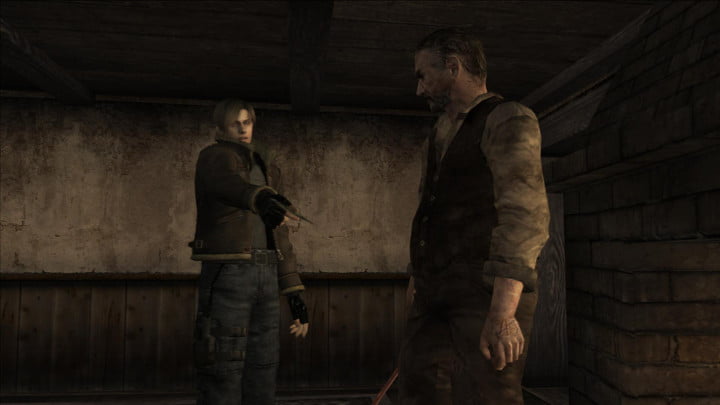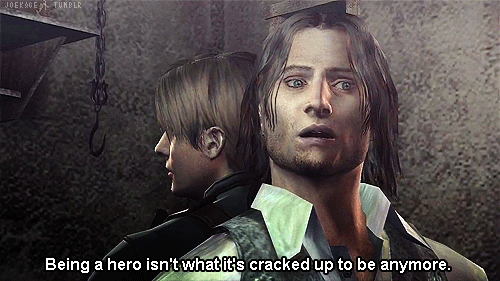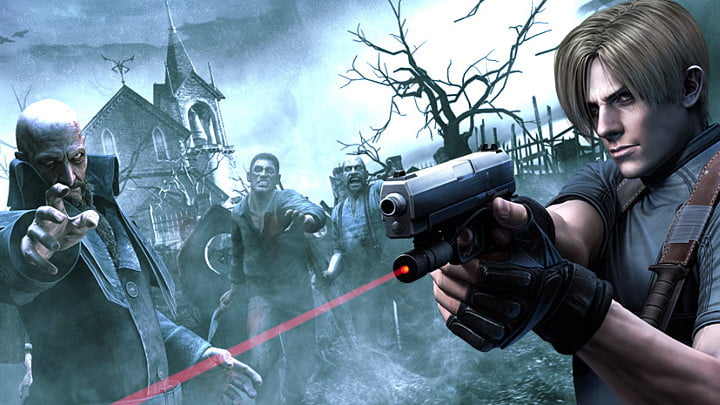It sounds ridiculous to call Resident Evil 4 ‘underappreciated’.
Resident Evil 4 – affectionately known as Resi 4 – is probably placed in ‘Top 10 video games of all time’ lists more consistently than just about any other video game. It had arguably the most significant influence on console gaming of any game of its generation. It’s been remade, remixed, and re-released approximately 1000 times. Whether you love it or hate it, you’d be hard pressed to call it underappreciated. And yet, here we are.
Resident Evil 4 is remembered fondly, but it’s generally as a great codifier. It defined the action horror game by giving us its most realised version. It’s video games’ Jaws. It stars an American secret agent who rescues the President’s daughter from an evil monster cult. He wears cool jackets, flirts with all the women, and makes terrible jokes. The cheesiness of the script is part of the charm; Resi 4 has all the subtlety and heart of Indiana Jones.
This isn’t in any way incorrect, but it is incomplete. Summing up Resident Evil 4 as a cliche ignores the ways it subverts and plays with the audience’s expectations. Capcom’s 2005 masterpiece isn’t only a traditional action story, it is also a self-aware breakdown of that story. Resi 4 was so influential because it succeeded in performing both of these contradictory roles simultaneously. Underappreciating these subversive qualities, therefore, not only ignores half of what made the game revolutionary, it ignores a historically critical influence on videogaming itself.
Fair warning: This article contains a truckload of spoilers for Resident Evil 4. Tread carefully, intrepid reader.
[youtube url=”https://www.youtube.com/embed/5EGjuZPaZsY” autoplay=”no”]As the game opens, Leon Kennedy narrates a recap of previous Resident Evil games. This montage serves several important purposes: first, it emphasises the centrality of Umbrella, the American pharmaceutical megacorporation behind Resident Evil’s zombies. Umbrella has since been dissolved, yet it’s established as the series antagonist immediately.
Next, the montage reminds us of Leon’s roots. In Resident Evil 2, Leon was a beat cop. His survival is more determined by luck and the intervention of more competent characters than his own resourcefulness. Being reminded of who Leon was frames his appearance in this game. His new demeanour takes on a hint of affectation. Leon may or may not be a hardened badass, but he’s certainly trying to be one. The recap ends by reminding us of the controversial decision to nuke Raccoon City, the site of the original zombie outbreak. When the bomb dropped, the zombie threat – along with evidence of Umbrella’s misdeeds –disappeared.
If this montage has the effect of framing Resident Evil 4 as a Resident Evil game then it also steers the player’s attention towards the ways Resi 4 picks apart the Resident Evil formula. Resi 4 immediately follows up this montage by subverting expectations yet again. The first enemy who attacks Leon was calmly tending to his fireplace moments before. He doesn’t have any obvious wounds, he’s not moaning for brains, and he isn’t covered in blood; he’s just a man. When Leon asks him about Ashley, he looks at Leon and speaks to him in Spanish. Then he swings his axe. When the player examines the body, Leon notes, “He’s not a zombie.”
 Source: http://ngemu.com/threads/resident-evil-4-comparisons.160072/
Source: http://ngemu.com/threads/resident-evil-4-comparisons.160072/
Resident Evil’s zombies are frightening because they lack humanity. There’s never a sense that anyone ‘in there’. The enemies in Resi 4, ‘Ganados’, are scary for the opposite reason: They’re people. We fight them in their homes, surrounded by their beds and food. When Leon first arrives in the village, he spots the villagers going about their daily routine. A woman is moving hay bales, while a man is tending to his pigs. In the town centre, a cop is burning in a pyre. When they’re trying to kill you, the Ganados think, use tools, and work together. When you barricade a door, they get a chainsaw. When you climb a tower, they burn the tower down.
Appropriately, Resident Evil 4’s Ganados manage to be monstrous and humanised at the same time. They’re ‘classic’ enemies for Resident Evil in the sense that their numbers are endless, they can’t be reasoned with, and they transform into hideous creatures. However, unlike classic enemies, they think and feel. That means we think and feel about them. Killing Ganados never quite feels automatic or comfortable like killing zombies does. When you shoot an enemy they gasp and hold their face in pain. As you wander through the villagers’ homes, Leon will comment on their personal belongings and wonder how they got to be the way they are. In previous Resident Evil games, killing zombies was a relief; it meant you had one less thing to worry about. In Resi 4, killing Ganados is troubling.
The fact that Leon’s new enemy can think dramatically changes the rules of engagement. Leon – and the player – aren’t used to being outmanoeuvred by the plans of an enemy, so we aren’t considering the obvious trap when Leon walks himself into a corner. The Ganados planted another one of their prisoners, Luis Sera, as bait for Leon. Instead of rescuing Luis, Leon lands him in even more trouble. After getting his ass kicked, again, Leon wakes up tied to Luis.

Luis Sera is probably the clearest way Resident Evil 4 pokes at its audience’s biases. Everything about Luis suggests that he’s the action movie sidekick. He and Leon seem like kindred spirits. They’re both disillusioned ex-cops thrust headlong into situations they could’ve never prepared for. They’re both resourceful, wise-cracking pretty boys. They even flirt similarly. The main difference between the two seems to be that Luis is Latino. Luis is supposed to be the minority sidekick who provides comic relief and information to move the plot forward. He’ll make Leon look cool and heroic by comparison. By the end of the game, Leon will have inspired Luis to believe he can make a difference again, and he’ll join the fight for ‘good’. This is exactly what Luis – and the game – want us to think.
Luis was never a cop. The story he tells Leon is a fabrication. Luis is the chief researcher responsible for the Las Plagas parasite controlling the Ganados. Luis is from the infected village. When he agreed to work for Saddler, the leader of the cult, Luis didn’t know what the Los Illuminatos were. He had hoped to prove himself to his hometown and was fascinated by the scientific potential of the Las Plagas. Tragically, he didn’t realise – or didn’t want to realise – what Saddler intended until was too late. Luis returned to the village to attempt to redeem himself by stopping the Los Illuminatos, saving his people and the world in the process.
Leon and Luis are still meant to be compared, but the result is less favourable for Leon. Luis has considerably more right to the role of protagonist than Leon does. Luis has a personal reason to be involved in the fight against Los Illuminatos. He has a heroic flaw he is seeking to redeem. He understands the situation that’s unfolding and what he needs to do to stop it. Luis is a genius, understands what’s going on, knows his enemy, and has an actual plan. Leon has none of these things, and it’s terribly apparent. What’s also terribly apparent is how screwed Leon would’ve been without Luis, and how Luis got screwed because of Leon.

The first time the Los Illuminatos capture Leon, they infect him with the Las Plagas. This constant ticking timebomb looms over Leon and Ashley – and the player – throughout the game. Resi 4 is a race against time. External threats take a backseat to internal, existential threats. We’re not just worried about being killed; we’re worried about becoming the thing we’re fighting. Enemies mock Leon constantly by reminding him that all his work will be undone. Saddler constantly alludes to how ‘useful’ Leon will be as another pawn in his army.
Los Plagas inverts typical zombie infection. There is still the fear of what your enemy will turn you into should you fail. However, failure in Resident Evil 4 doesn’t mean being ‘defeated’ by your enemy; it means becoming your enemy. The infected victims of Los Plagas don’t lose their sentience, rather, they become ‘true believers’. Usually, the external threat of zombification is met with physical resistance. In Resi 4, the threat is internal. Your physical resistance against it is insufficient. It’s only a matter of time.
In typical horror media, fear comes from ‘otherness’. We don’t understand what the enemy is or what they want, and that makes their savagery terrifying. However, otherness is not the fear that drives Resident Evil 4’s horror; it’s the enemy’s similarity our ourselves that makes them terrifying. Instead of an esoteric religion, Los Illuminatos is closer to a modern terrorist group. Saddler affects the act of being an enlightened priest – the same way Leon affects his badassdom – but in reality he’s a pragmatic, self-aware, and manipulative leader. The goals of the Los Illuminatos aren’t mysterious or even particularly ideological; they want to use their tools to expand their influence and gain power on the world stage. They’re not doomsday cultists, they’re colonisers.
Resident Evil 4 is broken into three distinct stages: the village, castle, and Island. In the village, you fight villagers (go figure). In the castle, you fight cultists. Finally, you confront Saddler on the Island. Here, you fight soldiers, armed with modern weapons and wearing body armour and camo. The Island looks more like an American military base than the headquarters of an evil cult. As you understand your enemy, Resi 4 transitions from the alien to the familiar.
[youtube url=”https://www.youtube.com/embed/uZU0g7edxuI” autoplay=”no”]This shift is epitomised in Jack Krauser. Krauser is the dark version of Leon, which makes his involvement in the plot critical. Obviously meant to evoke the classic American soldier, Krauser looks like a Rambo wannabe and talks with over-the-top bravado. He rants about being an American almost obsessively. He and Leon knew one another and worked together once. They fight the same way. Leon even puts together why he’s there uncharacteristically quickly for him; Krauser attributes this understanding to Leon also being American.
Krauser kidnapped Ashley for the Los Illuminatos. He incited the events of the game. And he did it for Umbrella.
Krauser and later Ada – secret protagonist and yet another manipulator – reveal that the American soldier is working with Wesker, the original Resident Evil big bad. Together, Krauser and Wesker infiltrated the Los Illuminatos in order to steal the secret of the Los Plagas. They wanted the Plagas in order to use its power to Make Umbrella Great again. Wesker is working with virtually unlimited resources supplied from the mysterious organisation he’s working with, an organisation that is implied to be connected with the American government. There’s a reason those nukes were used to erase Raccoon City, after all.
The true enemy in Resident Evil 4 was more familiar than we could have realised. Instead of an evil cult, the power manipulating events is, essentially, American capitalism. Krauser manipulated the Los Illuminatos because he wanted their power; Wesker manipulated Krauser because he wanted Krauser’s power. Saddler isn’t a zealot, he’s just another power-seeking player in a shadow game of geopolitics. The Los Plagas isn’t an alien force poised to change everything forever; it’s another ‘opportunity’ to be seized. Wesker and Krauser, representing America, are doing the same thing the Los Illuminatos are. Ada, representing a third, even more mysterious power, has an agenda of her own. In Resi 4, everyone is either manipulating or being manipulated, usually both. The player is the most manipulated character of all.
The idea that our enemy was different from us was only ever a ruse. Just like Los Plagas is literally an evil from within, the evil ideology of Resident Evil 4 was an American ideology. The same ideology, in fact, that Leon assumes with his disaffected, badass demeanour, his leather jacket, and his big guns. The evil of Resi 4 is not the evil of an ‘other’; it’s an evil we understand. An Evil within. A resident evil, if you will.

Eventually Leon triumphs over Saddler, at least, superficially. Under examination, however, Leon’s ‘victory’ is called into question.
First of all, Leon does none of the work that actually stops the Los Illuminatos. Luis invents the procedure that cures Las Plagas and ensures Leon and Ashley have time to use it. Ada provides Leon with information and directly saves his life twice. She even provides Leon with the only weapon that can kill Saddler during their fight. After Leon has killed Saddler (and done the rest of the work she wanted him to) Ada simply puts a gun to his head and makes off with the sample.
After we beat Resident Evil 4 we unlock a sub-story called ‘Separate Ways’. In ‘Separate Ways’ we see Resi 4 from Ada’s perspective. Ada manipulates every other party involved, especially the player themselves. Her plan involved keeping Leon distracted from the real conspiracy unfolding around him, using him as a directed wrecking ball to dismantle the Los Illuminatos for her while she focused on her goal. Ada is depicted as the classic genre femme fatale, right down to the provocative red dress. Again, this is exactly what she wants you to think. Many femme fatales are ultimately side characters in the male protagonist’s story. They sacrifice their agency or even their lives for the sake of the main character’s goals, but not Ada. If anything, she manipulates the player’s understanding of her role to her advantage in the same way she does to Leon.
Leon bumbles through Resident Evil 4, dispensing one-liners, throwing his knife around, and whining resignedly about ‘women.’ He’s clearly under the impression that he and Ada have a ‘star-crossed lovers’ thing going on. It fits into his – and our – narrative for the game; we’re a secret agent saving the world and getting the girl. Ada encourages this, because it’s crucial to her plan as the real primary agent. At the end of the game, Ashley asks Leon about Ada. He looks out over the ocean and wistfully tells her, “She’s a part of me I can’t let go.”
Meanwhile, Ada hangs up with Wesker and looks down at the apocalyptic biological weapon she just stole, satisfied. It doesn’t seem likely she’s thinking warm and fuzzy thoughts about Leon. Like Saddler tells Leon before the final battle, “The American prevailing is a cliche that only happens in your Hollywood movies.”
Resident Evil 4 wants you to feel like a hero so when it’s revealed that you were a pawn, it stings. Ada’s ‘Separate Ways’ and Leon’s failure are left to hang as lingering questions. What are Ada’s real motivations? Why were we so predisposed to see this game’s plot the way we did? If this plot isn’t what we thought it was, what else did we get wrong? Resi 4 manipulates its player in order to force them to confront their assumptions and reveals the fallacies of how we think about history, heroism, foreign intervention, and even the American way of life itself. Resi 4 uses cliche to implore its player to see cliches differently.
When we remember Resident Evil 4 as a straight example of the cliched story it subverts, we’re missing this crucial nuance. A big part of both Resi 4’s success and the influence it had on other games lies in the subversive questions it asks. Any conversations about the games that followed and were inspired by it, therefore, are incomplete if they don’t consider the ways in which Resi 4 broke down genre conventions.







Resident Evil 4 is not self-aware. Its cheesiness, awful story, terrible dialogue and over the top action sequences are 100{54aa50b9c141fdc6877fe76dd9617d72386c166c2b8f2ba44b2c6137e789c1e0} intended to be taken seriously. There was no subversive irony, no pretentious ‘post-modernist’ commentary, it was simply what the developers thought would be genuinely good.
There is no great mystery to RE4’s drastic departure from its predecessors; Capcom wanted to make a lot of money, and they knew action shooters make a lot more money than survival horror, so they put a bunch of people in charge of making the next Resident Evil and told them to make an action game. It also didn’t help that said individuals had no idea what made Resident Evil what it was. That’s why the story had literally nothing to do with the storyline of the series. That’s why the story is ridiculous and makes absolutely no sense. That’s the reason for all RE4’s so-called ‘genre-busting genius’ – nothing but greed and laziness and a massive lack of respect for fans.
As it turned out, Capcom got extremely lucky in that the GAMEPLAY itself was absolutely fantastic, so the game sold incredibly well and went down as one of the ‘greatest games of all time’.
But that’s all there was to it. Nothing but greed and laziness that happened to result in a game with great gameplay. Any attempt to build it up more than that, or to use tortuous logic to explain why it was all part of some intentional, self-reflective genius is simply pretentious people trying to rationalize why it is their favourite game is so utterly poor in every department other than gameplay.